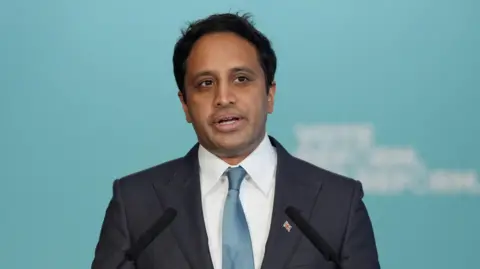Why Zia Yusuf's resignation matters for Reform UK
 PA Media
PA MediaThe resignation of Zia Yusuf as Reform UK's chairman matters because he was a central character in the stand out trend in British politics since the general election – the rise and rise of Nigel Farage's party.
After 11 months in the role, Yusuf said on Thursday that working to get the party elected was no longer "a good use of my time", without expanding further.
Farage described Yusuf as a huge factor in Reform's success in last month's elections, but added that he believed he had "had enough" of politics.
It comes after Yusuf said it was "dumb" for Reform's newest MP to call for a ban for the burka - a veil worn by some Muslim women that covers the face and body.
I first met this thirty-something Muslim son of Sri Lankan immigrants, a former Conservative, when he was unveiled by Reform almost exactly a year ago, as a donor who had just handed the party £200,000.
Yusuf is a self-made multi-millionaire after setting up and then selling Velocity Black, a luxury concierge service.
Not long after his donation to Reform, he was offered and accepted the job of party chairman. And he wouldn't just be someone behind the scenes, he would be a public figure too.
So how can we measure how important this moment is?
I reckon there are three things worth examining as we assess Zia Yusuf's contribution to Reform UK.
Firstly, money. Yusuf is a rich man, and giving away £200,000 is generous by any one's book. But Reform UK received £2.8m in donations last year, so the party isn't reliant on his money.
Secondly, Yusuf's heritage and ethnicity. To expand in popularity, let alone win a general election, Reform needs to widen its appeal. Having a minority ethnic man as one of its figureheads helped temper the criticism from rival parties that Reform, or at least some of its members or supporters, were racist.
And thirdly, his organisational abilities. Yusuf is credited with building much of the infrastructure up to now that Reform is attempting to assemble at lightning speed, to turn them from an insurgency into general election winners in just a handful of years. And now he is gone. The party has soared during his tenure, but it is also true that the now former chairman put rather a lot of noses out of joint within Reform.
"Were his interpersonal skills at the top of his list of attributes? No," Farage told GB News.
Staff shown the door would joke that they had been "Goldman sacked" – a reference to Zia Yusuf's former employer, the investment bank Goldman Sachs.
Plenty tell me the grumbles about his approach to running the party ran well beyond the gripes you can find in any workplace about the bosses.
Farage and the parties he has led – the UK Independence Party, the Brexit Party and Reform UK – have one heck of a track record of bust ups, fall outs, sackings and resignations.
Douglas Carswell, Diane James, Patrick O'Flynn, Godfrey Bloom, Suzanne Evans, Ben Habib, Rupert Lowe, the list goes on and on. And now Zia Yusuf.
The big reason why this latest departure really matters is it is a stark reminder that a central ingredient in the rapid scaling up of Reform UK is going to be the hiring of staff who stick around long enough to help turn it into a potentially election-winning machine.
The party is attempting something utterly unprecedented and while the force of Farage's personality has and can take them a long way, bringing in a range and depth of expertise at least some of whom can last the course will be central too.
Farage has never managed that before.
And right now, he has to find himself a new chairman.

Sign up for our Politics Essential newsletter to keep up with the inner workings of Westminster and beyond.
